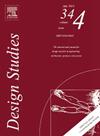Unraveling the nature of design thinking disposition: Contributions of trait cognitive flexibility and trait empathy on design thinking potential
IF 3.2
1区 工程技术
Q2 ENGINEERING, MANUFACTURING
引用次数: 0
Abstract
Design thinking, a human-centered and creative problem-solving approach, has garnered significant attention across various disciplines. However, its ambiguous conceptual nature and lack of a robust theoretical framework have been points of criticism. This study seeks to address the research question: What are the key psychological traits that contribute to an individual’s design thinking disposition? To explore this, a cross-sectional survey was conducted with 904 young adults (aged 18–35) from diverse ethnic backgrounds. The survey measured trait cognitive flexibility, trait cognitive empathy (perspective-taking), trait affective empathy (empathic concern), and design thinking disposition, alongside personality traits (e.g., openness to experience), demographics, and academic performance. Results indicate that trait cognitive flexibility is strongly associated with design thinking disposition, and this relationship is mediated by cognitive empathy (perspective-taking), but not by affective empathy (empathic concern). These effects persist even when controlling for personal attributes such as age, education level, and openness to experience. The findings highlight the pivotal role of cognitive flexibility and underscore the importance of cognitive empathy over affective empathy in fostering design thinking. This study contributes to a deeper understanding of the psychological foundations of design thinking and offers insights for developing evidence-based strategies to cultivate this important disposition.
揭示设计思维倾向的本质:特质认知灵活性和特质共情对设计思维潜能的贡献
设计思维是一种以人为中心的创造性解决问题的方法,在各个学科中都引起了极大的关注。然而,其模糊的概念性质和缺乏一个健全的理论框架一直是批评的点。本研究试图解决的研究问题:什么是关键的心理特征,有助于一个人的设计思维倾向?为了探讨这一点,我们对904名来自不同种族背景的年轻人(18-35岁)进行了横断面调查。该调查测量了特征认知灵活性、特征认知共情(换位思考)、特征情感共情(共情关怀)和设计思维倾向,以及人格特征(如对经验的开放程度)、人口统计学和学业成绩。结果表明,特质认知灵活性与设计思维倾向之间存在显著的相关关系,这种关系是由认知共情(换位思考)介导的,而不是由情感共情(共情关注)介导的。即使在控制了年龄、教育水平和经验开放性等个人属性后,这些影响仍然存在。研究结果强调了认知灵活性的关键作用,并强调了认知共情比情感共情在培养设计思维中的重要性。这项研究有助于更深入地了解设计思维的心理学基础,并为开发基于证据的策略来培养这一重要倾向提供见解。
本文章由计算机程序翻译,如有差异,请以英文原文为准。
求助全文
约1分钟内获得全文
求助全文
来源期刊

Design Studies
工程技术-工程:制造
CiteScore
8.60
自引率
20.00%
发文量
41
审稿时长
40 days
期刊介绍:
Design Studies is a leading international academic journal focused on developing understanding of design processes. It studies design activity across all domains of application, including engineering and product design, architectural and urban design, computer artefacts and systems design. It therefore provides an interdisciplinary forum for the analysis, development and discussion of fundamental aspects of design activity, from cognition and methodology to values and philosophy.
Design Studies publishes work that is concerned with the process of designing, and is relevant to a broad audience of researchers, teachers and practitioners. We welcome original, scientific and scholarly research papers reporting studies concerned with the process of designing in all its many fields, or furthering the development and application of new knowledge relating to design process. Papers should be written to be intelligible and pertinent to a wide range of readership across different design domains. To be relevant for this journal, a paper has to offer something that gives new insight into or knowledge about the design process, or assists new development of the processes of designing.
 求助内容:
求助内容: 应助结果提醒方式:
应助结果提醒方式:


